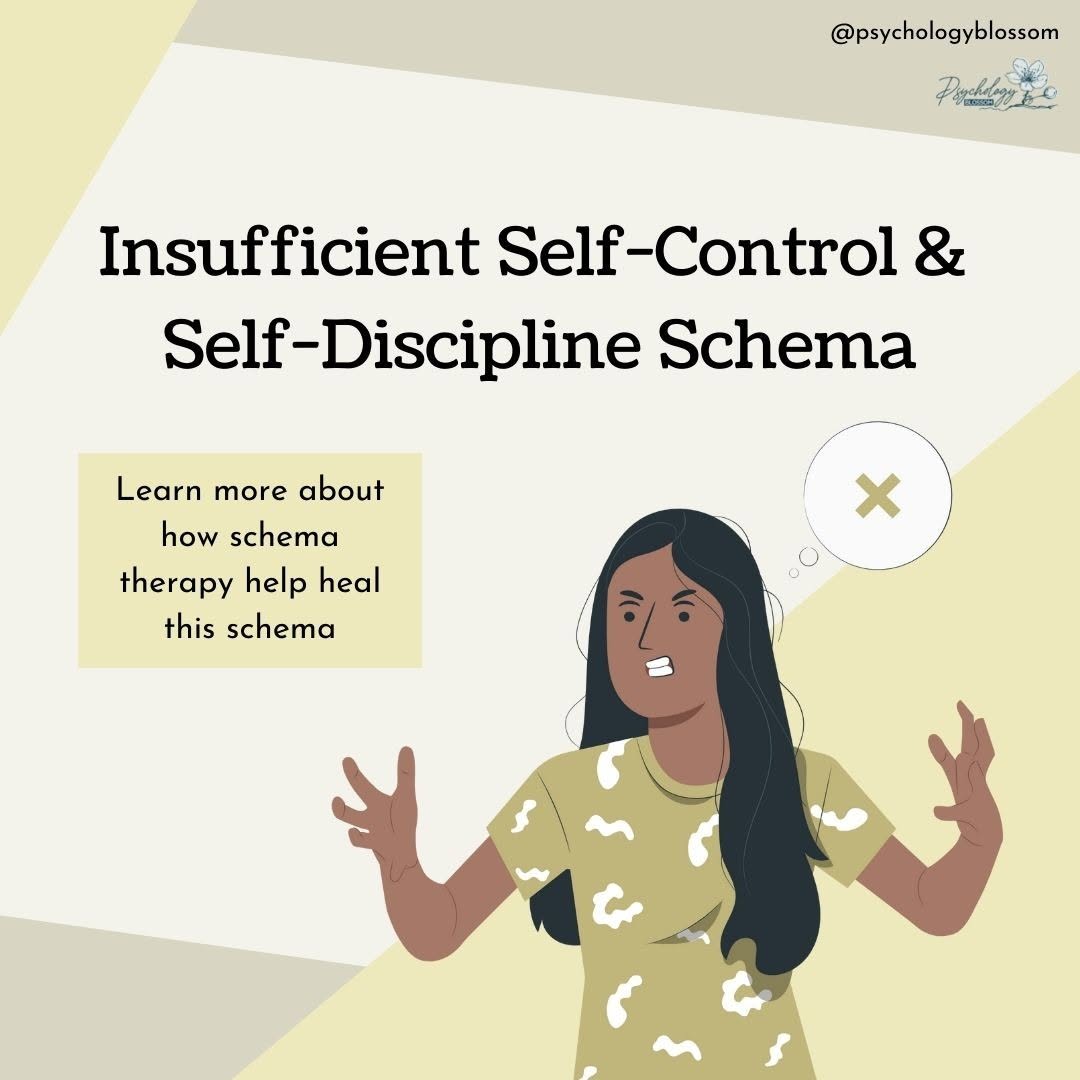Before diving into specific schemas, you might want to read our
introduction to Schema Therapy.
It provides a clear overview of the model and how schemas are understood and worked with in therapy.
Insufficient Self-Control & Self-Discipline Schema: Understanding the Struggle with Impulse and Structure
“I find it difficult to handle my emotions or manage frustration. So, when I get an impulse, I act on it. I avoid discomfort whenever possible. If I must do something hard before I get a reward, I tend to avoid it altogether.”
Does this message resonate with you?
What is the Insufficient Self-Control & Self-Discipline Schema?
We all may occasionally feel that we lack self-discipline in achieving our goals or doing what is good for us. However, someone with the Insufficient Self-Control & Self-Discipline Schema is likely to experience such feelings consistently.
This schema often manifests as a pervasive difficulty in controlling frustration, emotions, and impulses. It can trigger guilt and shame, but also feelings of laziness or incompetence.
Those affected usually struggle with two important qualities:
- Self-Control — the ability to regulate emotions and impulses
- Self-Discipline — the ability to tolerate boredom and frustration long enough to complete tasks
The underlying need behind this schema is to develop distress tolerance, emotional regulation, and confidence in one’s abilities.
Reactions from the Insufficient Self-Control & Self-Discipline Schema
There are three common ways people react when this schema is activated:
✽ Surrender
This means giving in to what the schema dictates. Life may feel overwhelming, with tasks piling up and unfinished projects. Daily chores are abandoned, and while activities shift quickly from one to another, necessary tasks remain incomplete. This fuels a cycle of procrastination and avoidance, leading to feelings of helplessness.
✽ Avoidance
Avoidance involves sidestepping situations that demand discipline or structure. By avoiding commitments, plans, or responsibilities, individuals temporarily escape the guilt of failure. However, they also rob themselves of opportunities to learn resilience, prioritisation, and the satisfaction of achievement.
✽ Overcompensation
Overcompensation is the opposite pattern. Here, individuals may impose rigid structure and routines to avoid the chaos of impulses. While this provides a sense of control, it can feel artificial or unsustainable, creating pressure rather than balance.
Causes of the Insufficient Self-Control & Self-Discipline Schema
Unlike other schemas, this one is not primarily driven by core beliefs but often stems from underdevelopment of the brain’s “executive control” centre — the Prefrontal Cortex. This part of the brain regulates self-discipline, impulse control, and follow-through on goals. It functions as the brain’s braking system.
There are several reasons this area may not develop optimally:
- Childhood emotional neglect or abuse — without nurturing input in early years, the Prefrontal Cortex may not develop fully.
- Prolonged childhood stress — chronic stress compromises the brain’s regulatory systems, impairing impulse control.
- Lack of boundaries or discipline during upbringing — without rules or accountability, children may fail to develop patience, distress tolerance, or the ability to delay gratification.
Effects of the Insufficient Self-Control & Self-Discipline Schema
One of the major consequences is difficulty finishing tasks. People often start projects but fail to complete them. This erodes the essential emotional need for accomplishment, leading to frustration, shame, and inadequacy.
Those with this schema also live at the mercy of their emotions. They may shift frequently between goals or abandon plans altogether. Without an internal “braking system,” they are also more vulnerable to addictive behaviours, such as substance use, overspending, or compulsive habits.
Over time, individuals may feel like life is pushing them around without direction. Feelings of failure, shame, and depression are common. Relationships may also be affected, as impulsive behaviour or lack of reliability damages trust and stability.
Treatment for the Insufficient Self-Control & Self-Discipline Schema
✽ Schema Therapy
Schema Therapy probes more deeply into early life experiences compared to standard cognitive therapy. It combines experiential, cognitive, behavioural, and interpersonal techniques, promoting lasting emotional and behavioural change.
In therapy, individuals explore why structure and self-control are so difficult. Therapists help clients acknowledge these challenges and develop new strategies for organisation, emotional regulation, and impulse control.
Common therapeutic techniques may include:
- Role-play and imagery exercises to practice delaying gratification and resisting impulses
- Behavioural homework, such as sticking to a small daily routine or completing one unfinished task
- Mindfulness and grounding exercises to manage emotional impulses
- Support from family or friends to reward progress and accountability
Through these methods, clients gradually build resilience, patience, and the confidence that they can handle discomfort and complete goals. Over time, therapy helps individuals move from impulsivity to intentionality, enabling a more balanced and fulfilling life.
We recommend This Video to those who want to learn more about the Insufficient Self-Control & Self-Discipline Schema.
